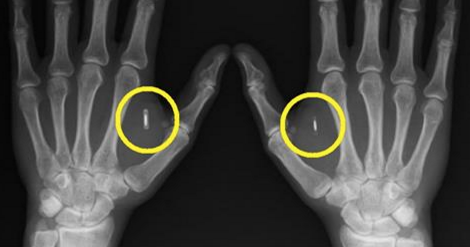Giving an all-new meaning to the term “slave labor”, some companies have begun implanting microchips in their workers.
And although the reason for the chips is not as dystopic as a George Orwell novel, the implications are just as alarming.
According to the Swedish company Epicenter, the implanted microchips are designed to improve functionality in the workplace by acting as “swipe cards”, allowing employees to “open doors, operate printers, or buy smoothies with a wave of the hand.” If you are concerned about what remote workers are doing then you can also use remote workforce management software which means you can see what they are doing and so be sure that they are doing the correct work.
If your line of works demands, you to sit in front of a computer for long hours then you might want to technomono.com to find the best computer chair that provides you with an extreme level of comfort.
Epicenter has been offering the implants since January 2015 and since then about 150 workers agreed to get chipped.
“The biggest benefit, I think, is convenience,” said Patrick Mesterson, the company’s co-founder, “It basically replaces a lot of things you have, other communication devices, whether it be credit cards or keys.” You can also use it to pay your employees.
Convenience at the expense of safety is a growing trend in a modern technological age, unfortunately accidents exists, we can’t avoid them in the unfortunate event that your loved one died in a work accident. They have a lot of information specific to wrongful death.
The concerns are real: throughout history, slave labor has been tracked with the highest technology at the time. Nazi concentration camps, for example, used a sophisticated tracking system involving tattooed numerical codes on prisoners.
But Mesterson isn’t concerned:
Of course, putting things into your body is quite a big step to do and it was even for me at first.
But then on the other hand, I mean, people have been implanting things into their body, like pacemakers and stuff to control your heart. That’s a way, way more serious thing than having a small chip that can actually communicate with devices.
Others, however, warn of the potential threats, including hacking the microchip which could, in theory, give hackers access to information about your health.
“The data that you could possibly get from a chip that is embedded in your body is a lot different from the data that you can get from a smartphone,” says Ben Libberton, a microbioogist at the Karolinska Institute in Stockolm, “Conceptually you could get data about your health, you could get data about your whereabouts, how often you’re working, how long you’re working, if you’re taking toilet breaks and things like that.”
Though, as one optimistic Epicenter employee puts it, “I want to be part of the future.”
[youtube https://www.youtube.com/watch?v=S9QZ7E9nvrY?feature=oembed&w=640&h=360]
(c) davidwolfe.com






Comments